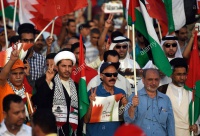Alkarama urges the Bahraini authorities to cease its attacks on human rights ranging from assaults on the freedom of expression and of peaceful assembly to denying detainees their legal safeguards and subjecting them to torture. The authorities must uphold their international obligations with regards to the International Convention of Civil and Political Rights (ICCPR) and the Convention against Torture (CAT) and refrain from cracking down on dissent.
Human Rights Violations on the Rise
In the morning of 13 June 2016, founder of the Bahrain Center for Human Rights Nabeel Rajab was arrested for "spreading false information". Rajab had been arrested numerous times and received prison sentences for repeatedly criticising the government and organising protests during the Arab Spring. The following day, Bahrain's main opposition party Al Wefaq was suspended and its assets frozen, under the pretext of the necessity to "protect society and combat extremism". This decision comes merely two weeks after the party's Secretary General Sheikh Ali Salman was sentenced to nine years in prison for "incitement to the promotion of the change of the political system by force, threats and other illegal means", "publicly insulting the Interior Ministry" and "publicly inciting others to disobey the law".
Over the past months, the government has increased its crackdown on freedom of speech and peaceful assembly. Alkarama documented the cases of two under aged brothers, Abbas and Bassel Jayed, tortured during their arbitrary detention and forced to sign statements confessing to the charge of "illegal gathering", a charge usually used to repress freedom of assembly and to prosecute individuals for taking part in demonstrations. In February 2016, the photojournalist Ahmed Jaber Al Fardan was sentenced to three months in prison, after being detained incommunicado and tortured for merely covering a local protest that took place in 2013. He was charged with "attempting to attend an illegal gathering".
Background
Bahrain was hit by the 2011 popular uprising in the Arab World with thousands of Bahrainis taking to the streets demonstrating for political reform as well as greater political inclusion. The violent crackdown in February and March 2011 left over 30 dead, mainly protestors and bystanders, five of which died under torture in detention, but also members of the security forces. The security forces arrested more than 1,600 people who participated in, or allegedly supported, the demonstrations, and held most detainees incommunicado for prolonged periods.
Due to mounting pressure of the international community, in July 2011, the King appointed the Bahrain Independent Commission of Inquiry (BICI) chaired by Cherif Bassiouni, to investigate allegations of human rights abuses during the uprising and issue recommendations for the improvement of the situation. In its report released in November 2011, the BICI confirmed that severe human rights violations were committed by the National Security Agency and the Ministry of Interior and that the crackdown followed a systematic practice of physical and psychological mistreatment, which in many cases amounted to torture.
Despite the establishment, since 2012, of the Office of the Ombudsman in the Ministry of Interior; the Special Investigations Unit in the Office of the General Prosecutor, the Prisoners and Detainees Rights Commission (PDRC) and the reinstatement of the National Institution for Human Rights (NIHR), impunity prevails in Bahrain as these institutions lack independence, efficiency and transparency. Alkarama will follow the situation closely in preparation for Bahrain's upcoming Universal Periodic Review (UPR), taking place in February 2017.
For more information or an interview, please contact This email address is being protected from spambots. You need JavaScript enabled to view it. (Tel: +41 22 734 1008)
 Algeria
Algeria Bahrain
Bahrain Djibouti
Djibouti Egypt
Egypt Iraq
Iraq Palestine/Israel
Palestine/Israel Jordan
Jordan Kuwait
Kuwait Lebanon
Lebanon Libya
Libya Mauritania
Mauritania Morocco
Morocco Oman
Oman Qatar
Qatar Saudi Arabia
Saudi Arabia Sudan
Sudan Syria
Syria Tunisia
Tunisia United Arab Emirates
United Arab Emirates Yemen
Yemen Other Countries
Other Countries






